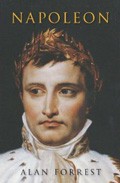You say that new research on Napoleon is best when it comes from a transnational viewpoint. In what way is your Napoleon transnational?
Alan Forrest: It is sometimes quite difficult to maintain an emphasis on the global or transnational aspects of the subject when writing a book that is essentially a biography, following a career that inevitably had France at its core, and I cannot claim to have done so to any systematic degree. But I have tried, I think, to avoid making the history of the period too exclusively focused on France. Some of the best recent work on the Empire has sought to explain its impact on other countries and to see the period – as Napoleon himself saw it – as one dominated by a European rather than a French vision. Historians have increasingly written the history of the Empire from a Europe-wide perspective, viewing it not only from Paris but from Piedmont, Naples, Amsterdam or Hamburg, emphasizing the degree to which the polity was affected by the traditions and cultures of the different states and nations where it was implanted.
Of course France remained of primary importance here; it was French institutions, French administrative structures and the French Code that were exported across Europe. But their implementation was not exclusively French. It relied on collaborators, as Isser Woloch and others have stressed, and the success of the imperial experiment depended mightily on the capacity of the Empire to find such collaborators among the local elites of Europe. And I have tried where possible to show awareness of these differences, of the two-way processes that were involved in establishing habits of governance and the structure of courts and justice across Europe. But the history of these years is not all about Europe. There is also an extra-European dimension, one where Napoleon showed himself less visionary – in the Caribbean, and especially in Haiti, which only recently has begun to force itself back into the master narrative of these years. The recent emphasis on the wars beyond Europe in turn remind us that the Napoleonic Wars were world wars, and that Napoleon, with his eyes fixed on a European land empire, was right to identify Britain, with its commercial superiority and extra-European colonial interests, as France's main adversary in the new world that was taking shape.
What was your approach to the ‘legend of Napoleon’? Embrace or rejection?



